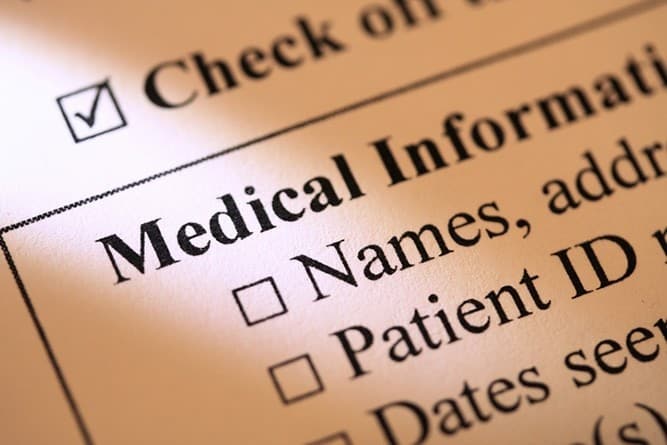A victim’s injuries and medical treatment are often a critically important part of any injury case. When you’re hurt, your medical records may be substantial proof of your injuries and the basis for calculating your damages. However, it’s imperative to make considerations about privacy when dealing with medical records in an injury case.
It’s essential to understand your rights when it comes to medical records after sustaining injuries in an accident. Nevada law has a lot to say about your medical records and who can see them when you bring a personal injury claim.
START YOUR FREE CONSULTATION
NO FEES UNLESS WE WIN!
Why Are Medical Records Important in a Personal Injury Case?
Your medical records are the place where you start to prove the extent of your damages. If you believe you may have a broken arm, your medical records might show that yes, you have a broken arm. Proving that you got hurt in the accident is the first step towards a fair recovery.
In addition to recovering for your medical expenses, you might also use your medical records as a launching point to calculate non-economic damages like pain and suffering. You may rely on your medical records to document the severity of your pain and loss of normal use of your body. The files are an essential piece of the puzzle for documenting and calculating your injuries.
You Have a Right to Your Own Records
A lot of the rules for medical records come from the Health Insurance Portability and Accountability Act of 1996 (HIPAA). This is a federal law that requires medical care providers to keep information private unless an exception applies.
The law also gives the states the power to determine the specifics about medical record privacy and allowing access in certain circumstances. Nevada law also provides a patient with the ability to keep medical information private.
You May Request Your Own Record
In Nevada, you have the right to request and inspect a copy of your own medical records. Nevada law 629.061 allows a patient to review their medical records within ten business days of making a request. You can also ask for copies. You must pay the cost of postage, and the provider can charge you up to 60 cents per page.
Can I Claim a Medical Privilege If I Don’t Want My Records Released?
In a personal injury case, the medical privileges in HIPAA and Nevada law aren’t the end of the story. When you bring a case, you’re putting your medical condition in dispute. You’re saying that you got hurt because of the actions of someone else. The other side has a right to investigate to determine if they agree with you.
The process of gathering evidence in an injury case is called discovery. The purpose of discovery is to help the parties find information relevant to the case. It also helps the parties narrow the issues at play. If the other side reviews your records and they agree with you, they may be more likely to offer you a fair settlement than if they’re kept in the dark.
Nevada law 49.245(4) says that medical records are fair game when they relate to “an issue of the condition of the patient in any proceeding in which the condition is an element of a claim or defense.” When you’re hurt in a personal injury, your physical condition is an element of the claim. That means the other side can demand to see the relevant medical records as they evaluate your claim.
What If They Want a Blanket Release for All of My Records?

Too often, the other side tries to use the privilege exception in order to insist on reviewing all of your medical records. They might even send you an intimidating blanket release that asks your medical providers for all of the files that have ever existed for you even years before your injury. Fortunately, Nevada law stops far short of allowing the other party to get away with this kind of harassment.
Pre-Existing Condition
The other side might want earlier medical records to investigate the possibility that you had a pre-existing condition. They might try to find earlier records that would make it seem like some or all of your injuries existed before the accident.
Related: How Pre-Existing Conditions Affect Your Injury Claim
While they’re allowed to ask for documents relating to a pre-existing condition if they have a reason to believe it might exist, they’re not allowed to just ask for any and all medical records you might have that are unrelated to the nature of the claim. The legal term for requesting records without a good reason is called a fishing expedition.
Objecting to an Overboard Request
If the other side is on a fishing expedition, you can object to their discovery demand. Rather than provide the answers to their request, you state that the information is privileged and the reason why. The courts must strike a balance between allowing them to collect information relevant to the case while protecting you from harassment.
The court might require you to list dates of medical treatment and whether the treatment related to any of the same body parts or functions as your medical treatment for your injury. The court might limit the discovery of your medical records to specific topics. You can work with your attorney to file the appropriate objections and request the court to rule on the issue.
Independent Medical Examination
Finally, the other side might ask you to submit to a medical evaluation by a person of their choosing. Most of the time, this is a physician that regularly works with the insurance company or the defense attorney.
It’s typical for the person doing the evaluation to predictably take the side of the person that’s paying the bill. While you can’t say no to the examination, your attorney can help the jury see the examiner’s bias.
How an Attorney Can Help
Defendants in injury cases often request too many medical records in an effort to embarrass or intimidate you. Adam S. Kutner, Injury Attorneys can help you maintain the right balance of what’s required and what could be considered overboard.
In addition to helping you keep your private medical information private, they can help you explain to the jury why the other side’s medical examination isn’t an accurate picture of your losses and damages. They can also help you use your own medical records to arrive at an accurate assessment of your economic and non-economic damages.
Areas We Service in Las Vegas, Nevada
Las Vegas Strip | Henderson | Anthem | Summerlin | Paradise | Spring Valley | North Las Vegas | Summerlin North | Summerlin South | Sunrise Manor | Nellis AFB | Desert Shores | Downtown South | Charleston | Richfield | Crestwood | Angel Park Ranch | Queensridge | Casa Grande Pines | Winchester | West Las Vegas | Green Valley North | Lake Las Vegas | Sun City Summerlin | La Madre Foothills | Tule Springs | Mac Donald Highlands | Green Valley Ranch
Adam S. Kutner reviews and testimonials
“I needed an attorney because I couldn’t deal with the accident on my own, so I needed someone else’s opinion about my accident.
Well I heard about Adam Kutner through an associate of mine and I chose to seek him because I heard of him before also, so I thought he would be the best option for me.
I was very happy with my settlement and it came quicker than I thought, in just a couple months I received a check in the mail.
When I recommend Adam Kutner I would tell them that the settlement comes very quickly, and he is very helpful with transportation and whatever else you may need.”
– Deborah Banks. 5/5 Stars
START YOUR FREE CONSULTATION
NO FEES UNLESS WE WIN!
SE HABLA ESPAÑOL
Call Now! Free Consultation!

Adam S. Kutner
PERSONAL INJURY LAWYER
With more than 34 years of experience fighting for victims of personal injury in the Las Vegas Valley, attorney Adam S. Kutner knows his way around the Nevada court system and how to get clients their settlement promptly and trouble-free.












